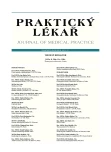-
Medical journals
- Career
Health Technology Assessment (HTA) in principles and regulations employed in the assessment of the degree of dependence
Authors: L. Čeledová 1; R. Čevela 1; T. Doležal 2; J. Klimeš 2,3
Authors‘ workplace: Ministerstvo práce a sociálních věcí ; Odbor lékařské posudkové služby, Ředitel: MUDr. Bc. Rostislav Čevela, Ph. D. 1; Institut pro zdravotní ekonomiku a technology assessment o. p. s, iHETA, Ředitel: MUDr. Tomáš Doležal Farmaceutická fakulta UK Hradec Králové 2; Katedra sociální a klinické farmacie, Vedoucí: prof. RNDr. Jiří Vlček, CSc. 3
Published in: Prakt. Lék. 2012; 92(5): 267-269
Category: Of different specialties
Overview
The article introduces a set of principles and regulations employed in the assessment of the dependence degree within the Health Technology Assessment system, applicable since January 2012 and serving as a basis for the social assistance allowance as stated by the Social Services Law. Dependence on another person is defined as the state when, due to a long-term health impairment, a person requires daily assistance, monitoring or additional care in order to be granted all the fundamental life requirements as specified by the law. Since January 2012, dependence assessment is based on eight legally defined principles and twelve regulations focused on assessing the functional impact on long-term health impairment. Principles and regulations of health assessment with respect to the degree of dependence assessment thus represent the first step in the process of utilising the HTA system in the medical assessment service, specifically in the adjudication and assessment of the patient’s health condition for the purposes of social security. This system also enables a prediction and transparent qualification of indirect costs of particular diseases and disabilities, based on positive and objective parameters.
Key words:
medical assessment service, dependence degree, indirect costs
Sources
1. Čevela, R., Čeledová, L. Nové posuzování stupně závislosti dle principů mezinárodní klasifikace funkčních schopností, disability a zdraví. Kontakt 2011, 13(3), s. 308–314.
2. Zákon č. 108/2006 Sb., o sociálních službách, ve znění pozdějších předpisů.
3. Čeledová, L., Čevela, R. Úloha posudkového lékaře a sociálního pracovníka v řízení o příspěvku na péči. Kontakt 2011, 13(1), s. 48–53.
4. Čeledová, L., Čevela, R. Nové medicínské paradigma posuzování stupně závislosti pro účely příspěvku na péči. Čas. lék. čes. 2011, 150(10), s. 550–553.
5. Čeledová, L., Čevela, R. Proč měnit posudkově medicínská kritéria pro posuzování stupně závislosti. Prakt. lék. 2011, 91(5), s. 337–340.
6. Kalvach, Z., Čeledová, L., Holmerová, I., a kol. Křehký pacient a primární péče. Praha: Grada Publishing. 2011, s. 371. ISBN 978-80-247-4026-3.
7. Seifert, B., Čeledová, L., Čevela, R., a kol. Základní pojmy praktického a posudkového lékařství. 1.vyd. Praha: Karolinum. 2012, s. 194.ISBN 978-80-246-2082-4.
8. Kalvach, Z., Zadák, Z., Jirák, R., a kol. Geriatrické syndromy a geriatrický pacient. 1.vyd. Praha: Grada Publishing, 2008. 336 s. ISBN 978
9. Mezinárodní klasifikace funkčních schopností, disability a zdraví: MKF. Praha: Grada Publishing. 2011, s. 280. ISBN 978-80-247-1587-2.
10. Vyhláška č. 505/2006 Sb., kterou se provádějí některá ustanovení zákona o sociálních službách, ve znění pozdějších předpisů
11. Klimeš, J., Doležal, T., Vlček, J. Kalkulace nepřímých nákladů obecně a ve vztahu k revmatoidní artritidě. Farmakoekonomika, 2011, 5(1), s. 2–9.
12. Kobelt, G. Health economic issues in rheumatoid arthritis. Scand J Rheumatol. 2006, 35(6), p. 415–425.
Labels
General practitioner for children and adolescents General practitioner for adults
Article was published inGeneral Practitioner

2012 Issue 5-
All articles in this issue
- Basics of social cognitive and affective neuroscience. XVIII. Interoception and emotional background
- Health Technology Assessment (HTA) in principles and regulations employed in the assessment of the degree of dependence
- Preventing workplace alcohol-related problems is an urgent concern
- REM behavior disorder – a neglected diagnosis
- Doctors and patients „in the suburbs” and „in the rose garden”
- Significant aortic stenosis in routine clinical practice
- Possibilities of use of canistherapy in prevention and treatment
- Previously expressed wishes. Comments on legislation
- Eosinophilic pneumonia and systemic vasculitis
- Atypical course of pneumonia with extrapulmonary complications due to Mycoplasma pneumoniae infection
- Does chocolate eating decrease risk of cardiovascular diseases?
- Influence of restrictive surgical treatment on body composition in morbidly obese patients: a pilot study
- Obesity - a protective factor in dialysis patients?
- General Practitioner
- Journal archive
- Current issue
- Online only
- About the journal
Most read in this issue- REM behavior disorder – a neglected diagnosis
- Eosinophilic pneumonia and systemic vasculitis
- Atypical course of pneumonia with extrapulmonary complications due to Mycoplasma pneumoniae infection
- Significant aortic stenosis in routine clinical practice
Login#ADS_BOTTOM_SCRIPTS#Forgotten passwordEnter the email address that you registered with. We will send you instructions on how to set a new password.
- Career

